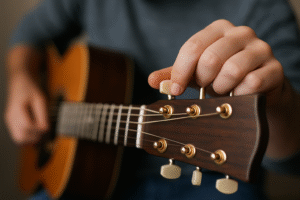You Don’t Have to Walk Alone
The Quiet Power of Spiritual Direction
I didn’t go looking for a spiritual director. Someone suggested it.
A friend of mine, who was already seeing one, said, “Thom, with everything you’re doing, especially discerning the diaconate, you should really think about it.”
So I did.
I didn’t have a dramatic reason or some major crisis. Just a tug in my heart that I couldn’t ignore. And a nudge from a friend who knew what he was talking about.
That first meeting? I had no clue what to expect. I showed up with a page of scribbled notes. Questions, ideas, things I was struggling with, things I didn’t understand. I read through them one by one, kind of like going down a grocery list. I wanted answers. I wanted clarity. But mostly, I just didn’t want to waste anyone’s time.
Over time, though, I learned something: spiritual direction isn’t about getting answers. Not really. It’s about being open. It’s about listening.
These days, I don’t come with an agenda. I walk in, sit down, and let the Holy Spirit lead. Sometimes the conversation goes exactly where I hoped it would. Other times, it veers off into something completely unexpected. But every time, it feels like exactly what I needed. Even when I didn’t know I needed it.
I got lucky. Through the guidance of the Holy Spirit, I found someone who does for me what I try to do for others. I can usually listen to someone and help them see what they might be missing. But I can’t do that for myself. I’m too close to my own stuff. My spiritual director is like a mirror held at just the right angle. He helps me see the blind spots. He helps me pause, reflect, and grow.
Sometimes it feels like talking to a really good friend. Someone who just gets you. Someone who listens without judgment and laughs with you when you realize you were overthinking everything. Other times, it feels like receiving advice from a father figure. The kind of wisdom that comes from someone who has seen more of life and knows how to offer just enough truth to challenge you and just enough compassion to keep you going. And sometimes, it feels like hearing a story from an older brother. Someone who’s been down the same road, made some of the same mistakes, and can tell you, from experience, that you’re going to be okay.
It reminds me of the Trinity. God the Father, Jesus our Brother, and the Holy Spirit, our Friend. When you’re sitting with your spiritual director, you might be hearing from any one of them. Or all of them. Sometimes you need a Father’s firmness. Sometimes you need a Brother’s empathy. Sometimes you need a Friend’s gentle nudge. And somehow, through the words and presence of this one person sitting across from you, God speaks in just the way your soul needs to hear.
I know a lot of people might hesitate. They might think spiritual direction is only for people in religious life or for folks going through a crisis. But the truth is, it’s for anyone who wants to walk more closely with God.
Think of it like having a trail guide. You still have to hike the path, but someone walks with you. Someone who’s seen the terrain before and knows how to help you navigate the rocky parts.
Or imagine you’re trying to tune a guitar. You might get close on your own, but it helps to have someone with a trained ear. They hear the dissonance. They guide you to harmony. A spiritual director does that for the soul.
Sometimes a spiritual director might suggest a book to read, a scripture passage to sit with, or a prayer to pray. Not as homework, but as a way to keep the conversation going between you and God. It’s a gentle nudge to keep walking forward, even after the meeting ends.
So what is spiritual direction?
It’s not therapy. It’s not confession. It’s not about being told what to do. It’s more like having a regular spiritual check-in with someone who’s trained to help you notice how God is moving in your life. They help you ask better questions. They help you hear the voice of the Holy Spirit in the everyday moments you might otherwise miss.
If you’re wondering how to start, here are a few simple steps:
- Pray about it. Ask the Holy Spirit to guide you to the right person.
- Ask around. Your parish priest, a deacon, or someone in your community may already know a good spiritual director.
- Start with a conversation. You don’t have to commit long-term right away. Meet once. See how it feels.
- Be honest. Bring your real self, not your polished version. This isn’t about impressing anyone.
- Be patient. Sometimes it takes a little time to build trust and rhythm. That’s okay.
You might also explore programs through your diocese, retreat houses, or local religious communities. Some even offer spiritual direction over Zoom. What matters most is that you feel safe, heard, and gently challenged.
Jesus said, “The Advocate, the Holy Spirit that the Father will send in my name, he will teach you everything and remind you of all that I told you.” (John 14:26, NABRE)
Spiritual direction has helped me hear that Advocate more clearly. Not with thunderclaps or burning bushes, but in quiet moments, gentle nudges, and the unexpected turn of a conversation.
If you’re feeling stuck, or hungry, or curious about what God is doing in your life, maybe this is your nudge too.
Try it. Ask. Listen.
Maybe, just maybe, the next step on your journey isn’t one you have to take alone.
![]()

